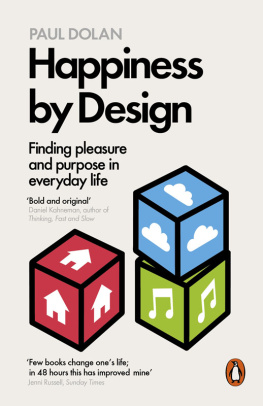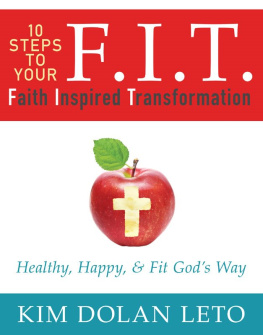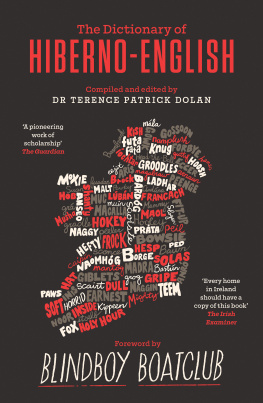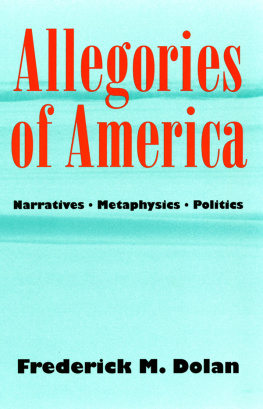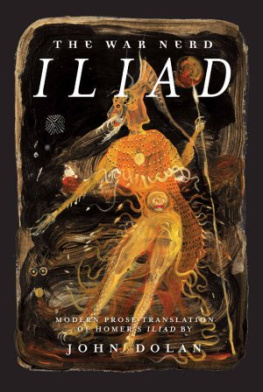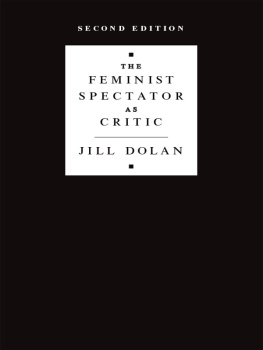Paul Dolan - Happiness by Design
Here you can read online Paul Dolan - Happiness by Design full text of the book (entire story) in english for free. Download pdf and epub, get meaning, cover and reviews about this ebook. year: 2014, publisher: Hudson Street Press, genre: Romance novel. Description of the work, (preface) as well as reviews are available. Best literature library LitArk.com created for fans of good reading and offers a wide selection of genres:
Romance novel
Science fiction
Adventure
Detective
Science
History
Home and family
Prose
Art
Politics
Computer
Non-fiction
Religion
Business
Children
Humor
Choose a favorite category and find really read worthwhile books. Enjoy immersion in the world of imagination, feel the emotions of the characters or learn something new for yourself, make an fascinating discovery.

- Book:Happiness by Design
- Author:
- Publisher:Hudson Street Press
- Genre:
- Year:2014
- Rating:3 / 5
- Favourites:Add to favourites
- Your mark:
- 60
- 1
- 2
- 3
- 4
- 5
Happiness by Design: summary, description and annotation
We offer to read an annotation, description, summary or preface (depends on what the author of the book "Happiness by Design" wrote himself). If you haven't found the necessary information about the book — write in the comments, we will try to find it.
Happiness by Design — read online for free the complete book (whole text) full work
Below is the text of the book, divided by pages. System saving the place of the last page read, allows you to conveniently read the book "Happiness by Design" online for free, without having to search again every time where you left off. Put a bookmark, and you can go to the page where you finished reading at any time.
Font size:
Interval:
Bookmark:

HUDSON STREET PRESS
Published by the Penguin Group
Penguin Group (USA) LLC
375 Hudson Street
New York, New York 10014

USA | Canada | UK | Ireland | Australia | New Zealand | India | South Africa | China
penguin.com
A Penguin Random House Company
First published by Hudson Street Press, a member of Penguin Group (USA) LLC, 2014
Copyright 2014 by Paul Dolan
Penguin supports copyright. Copyright fuels creativity, encourages diverse voices, promotes free speech, and creates a vibrant culture. Thank you for buying an authorized edition of this book and for complying with copyright laws by not reproducing, scanning, or distributing any part of it in any form without permission. You are supporting writers and allowing Penguin to continue to publish books for every reader.
 REGISTERED TRADEMARKMARCA REGISTRADA
REGISTERED TRADEMARKMARCA REGISTRADA
LIBRARY OF CONGRESS CATALOGING-IN-PUBLICATION DATA
Dolan, Paul, 1968
Happiness by design : change what you do, not how you think / Paul Dolan, PhD ; foreword by Daniel Kahneman.
pages cm
Includes bibliographical references and index.
eBook ISBN 978-0-698-15692-0
1. HappinessPsychological aspects. I. Title.
BF575.H27D65 2014
158dc23 2014004748
While the author has made every effort to provide accurate telephone numbers, Internet addresses, and other contact information at the time of publication, neither the publisher nor the author assumes any responsibility for errors or for changes that occur after publication. Further, publisher does not have any control over and does not assume any responsibility for author or third-party Web sites or their content.
Version_1
T here are two central issues in the study of happiness (I tend to prefer the label of subjective well-being). The first is a classic distinction, which goes back at least to Aristotle, between two views of the good life: a life of pleasure, contentment, and other positive feelings, or one that is well-lived and meaningful. A clear choice of one over the other has its problems. A preference for joy over meaning gets you labeled a hedonist, which is not a compliment. On the other hand, you are properly called a scold if you proclaim that pleasure is frivolous and that only virtue and meaning matter. How should you define happiness if you wish to be neither a hedonist nor a scold? The other great question about happiness is how to measure it. Should we study how people feel as they go about their life, whether they mostly experience happiness or misery? Or should we ask people to stop and think about their life, and report whether or not they are satisfied with it?
The two questions appear to be related. It seems natural to use measurements of life satisfaction to study whether people find meaning in their life, and to identify happy feelings by measuring ongoing experience. That was also my view for many years, but Paul Dolan has a different idea. To begin with, he is much more interested in peoples experiences of life than in their evaluations of their life. The novel idea is to consider meaningful and meaningless as experiences, not judgments. Activities, in his view, differ in a subjective experience of purposefulnessvolunteer work is associated with a sense of purpose that channel-surfing lacks. For Dolan, purpose and pleasure are both basic constituents of happiness. This is a bold and original move.
The question What does happiness consist of? is not answered by listing facts about happiness. It is about the proper use of the word: when people speak of happiness, what do they have in mind? No answer can be completely satisfactory, because people do not always have the same idea in mind when they use the word. Among the imperfect definitions of happiness, the pleasure-purpose concept that Dolan offers is, I believe, a strong contender. It is a good description of what I wish for my grandchildren: a life that is rich in activities that are both pleasurable and meaningful.
Paul Dolan is an inveterate optimist who has overcome many obstacles on his way to becoming an internationally recognized expert on well-being. The optimism shows on every page of this book. In particular, Paul is optimistic about you, his reader. He believes that you can make your life both pleasurable and meaningful with deliberate choices, about the environment you create for yourself and about the aspects of life that deserve your attention. He offers a great deal of sound advice on how to make these choices and how to follow through with them. The rest, he says, is up to you.
Daniel Kahneman
I d like to thank you for buying my book. It makes me happy, and I hope it will make you happy, too. Im fascinated by happiness and human behavior, professionally and personally, and I get plenty of opportunities to fuel my fascination. Before writing an entire book on happiness, I was asked to devise the questions that are now being used in large surveys of happiness in the UK and also to advise the UK government on how to design better behavior change interventions. I am now increasingly being asked to advise charities, multinational companies, and other governments about how they can improve happiness and influence behavior.
My professional fascination with happiness came about largely by chance. I had spent a decade conducting academic research into how we should measure and value the benefits of health care spending. This work was recognized with a Philip Leverhulme Prize in 2002 for my contribution to health economics, which meant that I could take some time out from teaching at the University of Sheffield and attend a few conferences. One such conference, on the economics of happiness and held in Milan in March 2003, turned out to be the most significant event of my academic life. On the way to the conference dinner, I sat next to a man who introduced himself as Daniel (Danny) Kahneman. I knew exactly who he was. As many of you know, too, Danny is a psychologist who won the Nobel Prize in Economic Sciences in 2002. He has subsequently written Thinking, Fast and Slow, which is a brilliant book about human behavior and decision making.
Danny was immediately engaging and interested to hear about what I was working on. After a few minutes, he said, Why not come to Princeton [where he worked] and we can work together? I thought about that for about a nanosecond and said, Yes, please. Beyond being one of the nicest people I have ever met, Danny is my intellectual hero. In fact, that whole conference was pretty life changing as I also met Richard Layard, one of the most famous happiness researchers in the world and author of Happiness: Lessons from a New Science. Richard was instrumental in my move to the London School of Economics in 2010.
Since meeting Danny and Richard, I have been conducting research into happiness and its causes. Sometimes this has involved analyzing existing data sets; other times it requires me to gather my own data. This has quite naturally led to research into understanding human behavior, using experiments conducted in the lab and in the real world. A large part of how you feel is determined by what you do, what you do is largely motivated by the expected impact on your happiness, and happiness is the feedback you receive about the impact of what you do. You can see how its all very cyclical.
As one of the small number of researchers working on
Font size:
Interval:
Bookmark:
Similar books «Happiness by Design»
Look at similar books to Happiness by Design. We have selected literature similar in name and meaning in the hope of providing readers with more options to find new, interesting, not yet read works.
Discussion, reviews of the book Happiness by Design and just readers' own opinions. Leave your comments, write what you think about the work, its meaning or the main characters. Specify what exactly you liked and what you didn't like, and why you think so.

